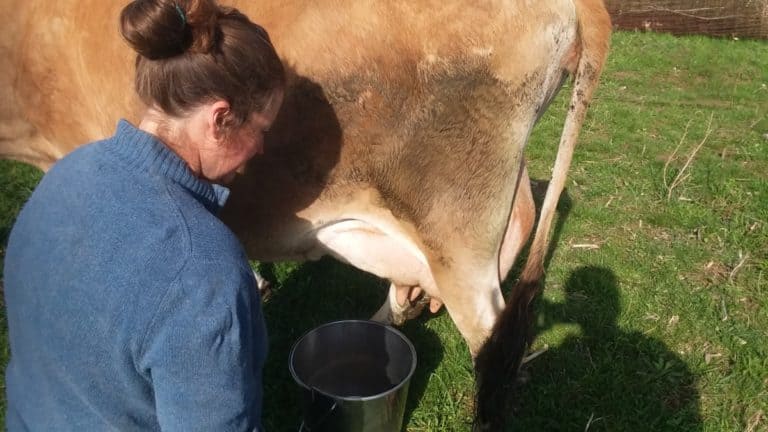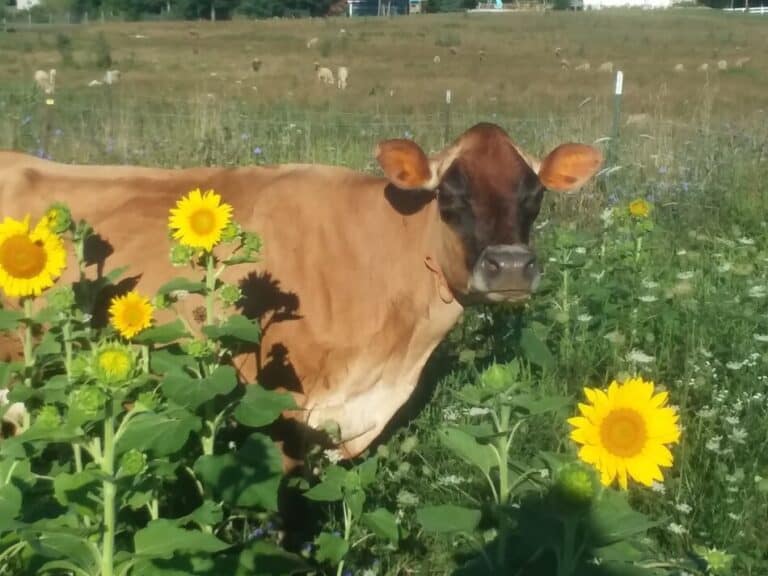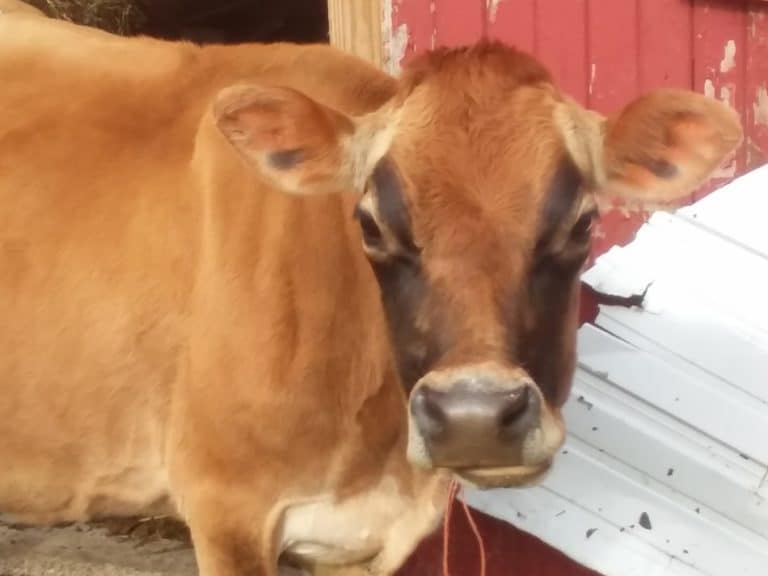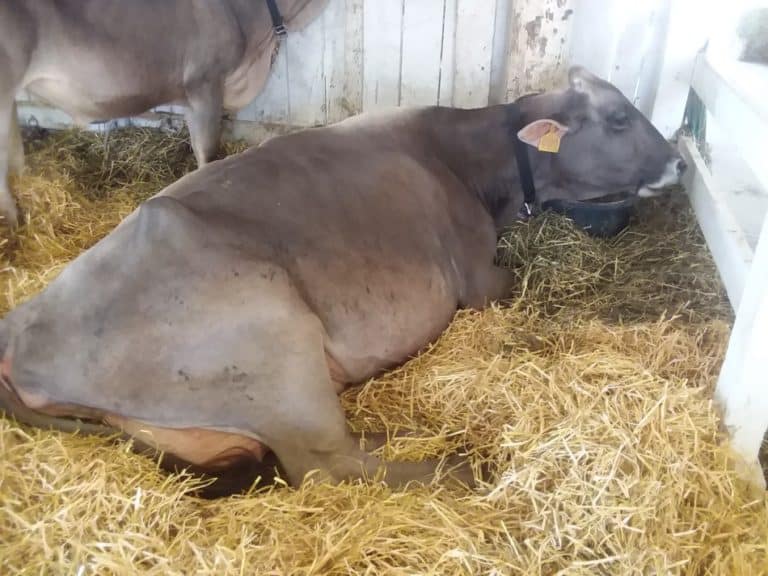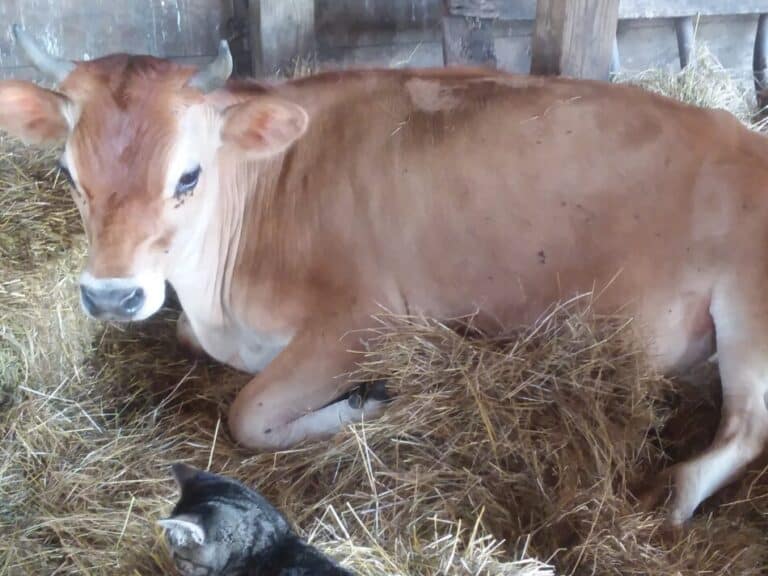A Family Milk Cow: How Much Will She Cost?
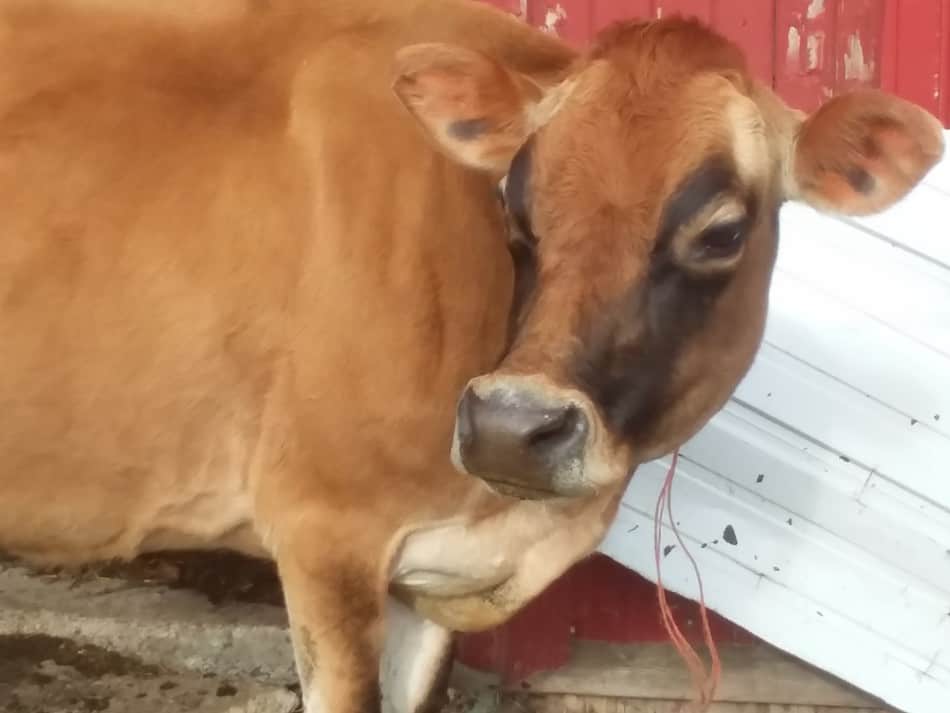
Having plenty of fresh real milk, making your own cheese and yogurt, knowing where your food comes from…all awesome! And all doable when you get a family milk cow.
Now to the big question-How much is this gal going to cost?
A family cow will cost between $1,000-2,500. In an area that does not have many dairy cattle or if you purchase an unusual breed of dairy cow the cost will be higher.
How do you know if you’re ready? My guide “Are You Ready For A Family Cow?” will walk you through the things you need to have figured out, including feeding needs and daily care, before you get your cow.
Cost of the cow
Here in North Central Ohio, we have a number of dairy farms and numerous dairy sales throughout the year.
We’re lucky to live in an area with so many breeds of cattle and farmers milking cattle.
Maybe you’re thinking, “what does this have to do with the cost of a diary cow?” A lot, actually!
In “dairy country” getting a family cow will be easier, probably less money and you will have more choices of breeds and individual cows.
I have gone to two breeding stock quality dairy cow sales in the past few months, specifically to get accurate family cow prices. (I have to admit, I like going to the sales anyway!)
Based off of what I saw at these sales, a price range of $1,000-2,500 is appropriate for a high quality, well bred (good genetics) cow with family milk cow potential.
Specifically notice the well bred part and the potential family cow part.
5 Best Breeds Of Family Cow is a shorter list of just the breeds that we have found are the most beginner friendly.
A high quality, well bred cow
Buying a cow is a significant investment, in money and time, you want to have her around for a good while. Buy a good cow from the start.
You want to be sure to get a cow that will physically hold up, by that I mean one that is structurally sound. Structurally sound means that the parts of her body work together in a way that will make it easy for her to move and function in all the ways a cow needs to.
Of course, since she is a milking cow, a big part of her functionality is that she can keep milking for you.
You’re looking for a cow with a healthy, well supported udder that will be easy to milk.
The bottom of the udder should be above the hocks and the teats should be long.
For more specifics on cow selection read my article How To Select A Family Cow.
Family milk cow potential
I wrote “potential” because not all cows have the temperament to be a good family milk cow candidate. This is a big deal.
If I were looking to get another cow, attitude is my number one selection criteria.
Her attitude and ease of milking are characteristics you will now have in your life twice a day, every day for years to come.
Get a cow that is nice to be around.
Other cow costs
Like all other animals, your cow will need to be fed when the pastures are not growing, have a mineral/salt block, occasionally get dewormed, and could require veterinary care.
If you have other animals, then you’ve got this! You already are familiar with sourcing hay and grain and have a relationship with a local vet. If not, get these things figured out before you get a cow.
Get a large animal vet
Find a large animal vet to work with, ideally one that handles dairy cattle care on a regular basis.
I know that in some areas a dairy vet will be tough to find, if not impossible. Do what you can, but if you have the option use it!
Which breed to choose?
Don’t get too hung up on this one. Too many people think they have to get a certain breed of cow, when what you are really looking for is a cow with a specific set of characteristics-gentle, long teats, good attitude.
There are a few traits I would not consider acceptable for a family milk cow, like poor health, bad attitude, kicky, or bad udder/three quartered. None of these are breed specific.
If you want to get more into breeds of dairy cattle, read my article 12 Breeds Of Dairy Cattle.
In addition to our experience with the breed, I also list out common characteristics that we have found these cows to have and if that breed tends to be family milk cow material (or not).
How do you know if you’re ready? My guide “Are You Ready For A Family Cow?” will walk you through the things you need to have figured out, including feeding needs and daily care, before you get your cow.
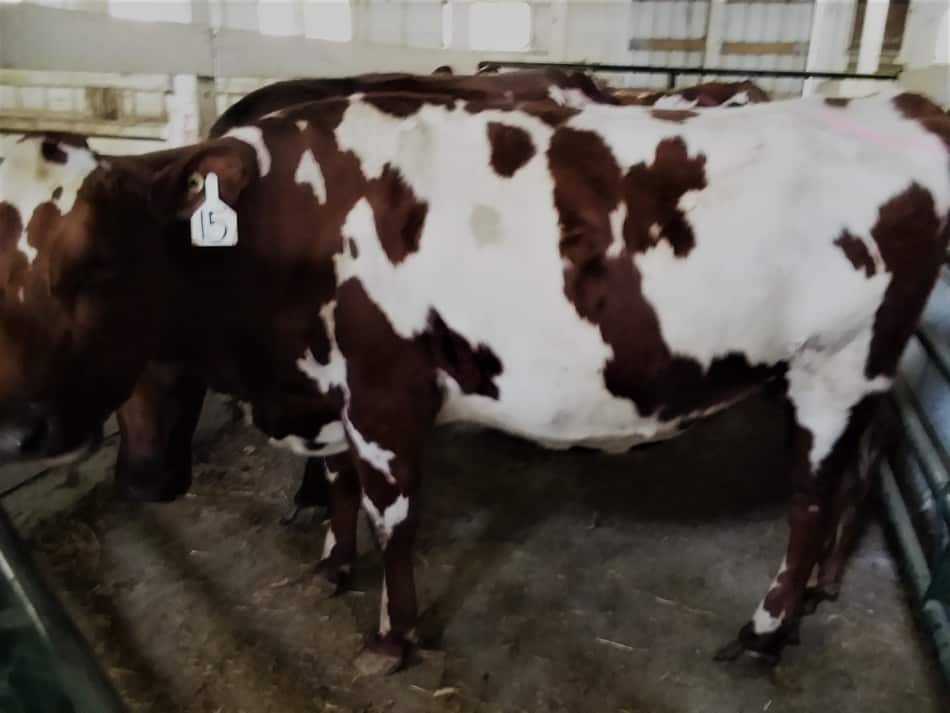
Cow or heifer?
Short answer: get a cow, not a heifer!
Long answer: I see multiple articles online and even in some videos, suggesting that you get a heifer to raise up to be your family milk cow.
This seems like a good suggestion on the surface, I’ll admit, but be wary.
The reason this seemingly sensible idea is a poor decision is that a heifer is unproven.
You have no idea what her attitude will be like, what her udder will be like, and if she’s open (not bred) you’ll have that to figure out as well.
These are lot of new challenges for someone just getting started.
If you buy a heifer, you are setting yourself and your family up for a difficult, stressful time period until you can get her trained to milk.
What’s this “trained to milk” stuff? Reality, that’s what it is!
Your heifer is new to all of this, having a baby, you all of a sudden poking around and expecting her to stand still while you do it, these are big changes for her.
It will take some time for your used to be heifer, now a cow to get used to her new life as a working mom.
Adding to the confusion mix, is the part about how you don’t know what you are doing either.
That’s a tough situation! Is it doable? Yes. Is it your best option? No.
Raising A Family Cow is a nice overview article from Maine Organic Farmers, check it out for an additional perspective on choosing and caring for your family cow.
Start your milking journey off right!
Option one-get a heifer 🙁
You’re new to milking and the heifer is new to milking, yikes!
Dispite what you may read online, this is a recipe for disaster, or at the very least, an incredibly rough start.
Option two-get a cow 🙂
You’re new to milking and you bought a cow that knows what’s going on and has proven herself to be a amicable gal. Yes, great idea!
I am well aware that a cow (vs a heifer) is likely to be more money (see the exception below).
She’s worth it! A cow is proven, she knows what’s going on, she’s already trained for you, you know her attitude, udder structure and teat length. Save up and buy the cow!
You’re lucky if you live by a dairy farm!
If you live in a dairy area, deciding to get a cow is great! Cows that will be perfect for a family milk cow will actually be less money than a heifer!
Why? For a commercial dairy, an older heifer has all of her milking career ahead of her, so she’s worth more money.
A cow that is 3-5 years old is likely to be replaced soon, because in theory, the younger cattle should be better (more milk).
For you a 3-5 year old cow is just getting started! Our cow, Aleene is 14 and going strong!
And don’t be too worried about a cow sold for low production in a commercial dairy, as long as she looks healthy and meets your other criteria like good attitude.
Low commercial milk volume will still be more than enough for you and your family!
What about a beef cross?
If you can get a trained to milk half beef half dairy cow, that would be another option as long as you are fine with the lowered milk production.
The catch here is finding the cow, since most of these crosses would not be trained to milk, but if she is and you like her then a half dairy half beef cow should make a great family cow.
Remember, attitude is more important than anything else. If she is easy to get along with and easy to milk, the genetics of her parents are of much less importance to me.
How do you know if you’re ready? My guide “Are You Ready For A Family Cow?” will walk you through the things you need to have figured out, including feeding needs and daily care, before you get your cow.

